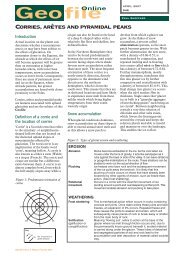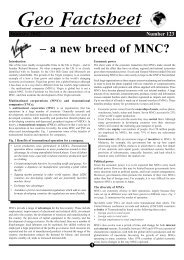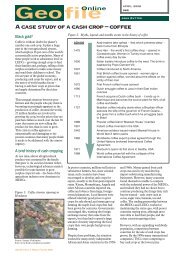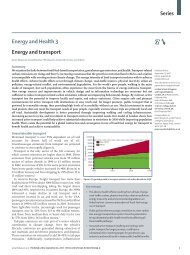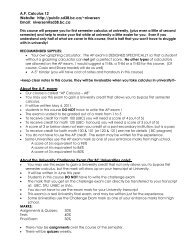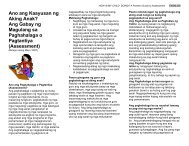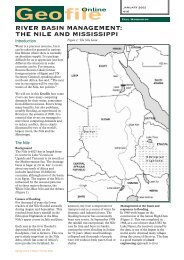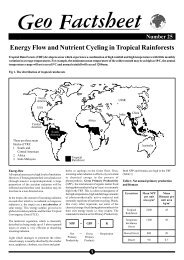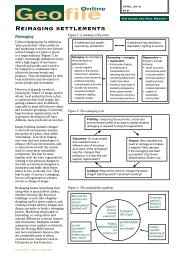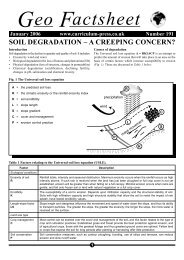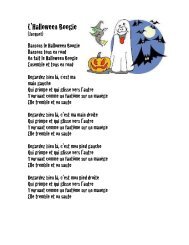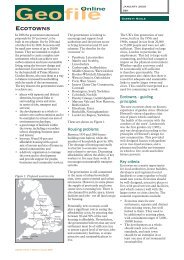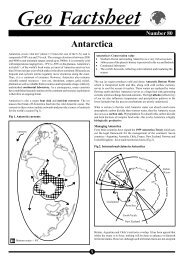Separatist Issues: Case Study â The Kurds - School-Portal.co.uk
Separatist Issues: Case Study â The Kurds - School-Portal.co.uk
Separatist Issues: Case Study â The Kurds - School-Portal.co.uk
You also want an ePaper? Increase the reach of your titles
YUMPU automatically turns print PDFs into web optimized ePapers that Google loves.
January 2005 no.487 <strong>Separatist</strong> <strong>Issues</strong>: <strong>Case</strong> <strong>Study</strong> – <strong>The</strong> <strong>Kurds</strong><br />
Figure 7: Extract from a newspaper<br />
published in June 2004 by the<br />
Democratic Party of Iranian Kurdistan<br />
Vast waves of protests in<br />
Kamyaran<br />
<strong>The</strong> cruelty of the Iranian Islamic regime<br />
is no longer a mystery for the <strong>Kurds</strong> in<br />
Iranian Kurdistan. To suppress the <strong>Kurds</strong>,<br />
the vicious regime of Iran has <strong>co</strong>nstantly<br />
resorted to different terrible methods<br />
such as persecution imprisonment and<br />
killing. What happened in Kamyaran,<br />
situated between Kirmanshah and<br />
Sanandaj Provinces, in recent days is just<br />
the <strong>co</strong>ntinuation of those inhumane<br />
methods and suppressive policies of<br />
regime in the region.<br />
Rashid Haidari<br />
Iraqi Postscript<br />
Although many <strong>Kurds</strong> support the<br />
Americans over the removal of the<br />
Ba’athist regime of Saddam Hussein,<br />
they are suspicious that political<br />
<strong>co</strong>nvenience and the US presidential<br />
elections will result in hasty<br />
decisions on Iraq’s future which<br />
<strong>co</strong>uld mean the <strong>co</strong>untry is handed<br />
over to Shia clerics who claim to<br />
represent the majority of Shia Arabs<br />
in the south. <strong>The</strong> unity of Iraq <strong>co</strong>uld<br />
be at stake if the <strong>co</strong>untry’s<br />
permanent <strong>co</strong>nstitution fails to<br />
preserve Kurdish demands for a<br />
federal state.<br />
Figure 8: Extract from a poem (to read the poem in its<br />
entirety, go to http://www.kurdistanobserver.<strong>co</strong>m/)<br />
‘I want a state called Kurdistan’<br />
[To the UN]<br />
Poem by Dr Kamal Mirawdeli<br />
I want a state called Kurdistan<br />
My homeland since the first day of the creation<br />
I want my own nation<br />
I want Kurdish nan<br />
From every great tradition of Kurdistan<br />
To be sold in all supermarkets in the world<br />
So that I can say<br />
Actually the barley and the wheat<br />
That produce bread<br />
That makes the world fed<br />
Were first cultivated<br />
In the land of Karda<br />
Where <strong>co</strong>ws and sheep<br />
Were also nurtured<br />
And agrarian revolution<br />
I want Kurdish music of Zirak and Zozan<br />
To be promoted by my state<br />
Played on every radio<br />
Heard by every audio<br />
Want my Kurdistani flag to shake<br />
With every diplomatic handshake<br />
I want my Kurdish embassies in the world<br />
With sections for culture, tourism and <strong>co</strong>mmerce<br />
Bringing together Kurdish talents, skills and knowledge<br />
And promoting Kurdish culture and language<br />
With the recent regime change the<br />
<strong>Kurds</strong> are emerging from their<br />
isolation and starting to reintegrate<br />
themselves into Iraq. But will<br />
<strong>co</strong>mmunication with the Shia Arabs<br />
in the south be in Arabic or in<br />
English<br />
Acknowledgements<br />
Rebecca Ullman<br />
<strong>The</strong> Kurdish Human Rights Project<br />
http://www.pdk-iran.org/<br />
<strong>The</strong> Democratic Party of Iranian<br />
Kurdistan<br />
http://www.kurdishmedia.<strong>co</strong>m/<br />
<strong>The</strong> Kurdish Media<br />
http://www.kurdistanobserver.<strong>co</strong>m/<br />
<strong>The</strong> Kurdistan Observer<br />
Kurdistanica<br />
<strong>The</strong> First Encyclopaedia of<br />
Kurdistan<br />
Focus<br />
1. Find all the place names mentioned in this article, in your atlas.<br />
2. <strong>Study</strong> the graphs in Figure 3. Draw graphs to show the percentage of<br />
<strong>Kurds</strong> living in the individual <strong>co</strong>untries in 2000; and the estimated<br />
percentages for 2020 and 2050. Comment on your findings. What<br />
assumptions have been made in estimating the population Why have<br />
different organisations estimated different totals<br />
3. What is the evidence for separatist feeling<br />
Questions<br />
4. What are the geographical, historical, e<strong>co</strong>nomic, social and cultural<br />
reasons for Kurdish separatism<br />
5. What are the <strong>co</strong>nsequences of Kurdish separatist pressures<br />
6. What are the attitudes of the different groups of people involved<br />
Geofile Online © Nelson Thornes 2005



